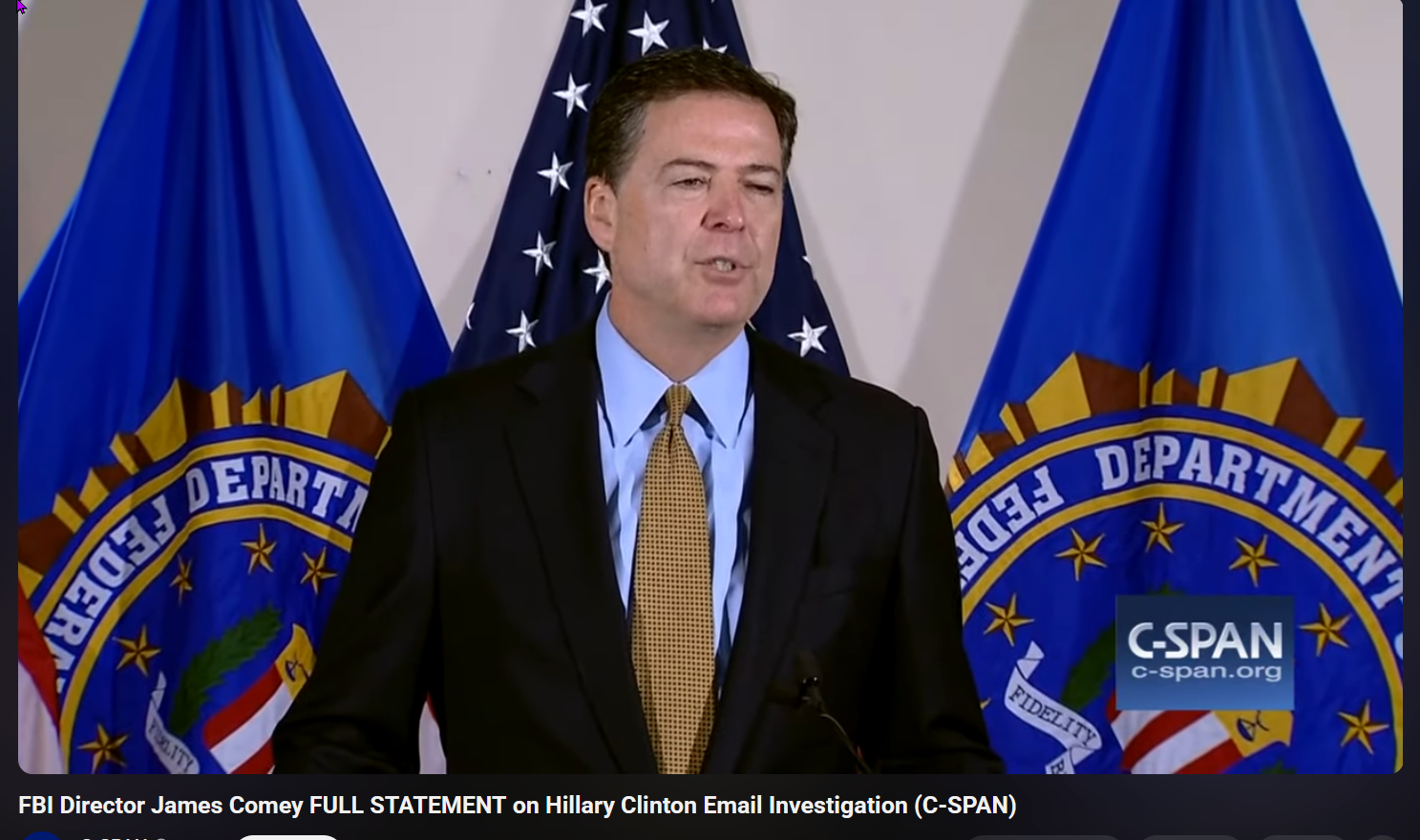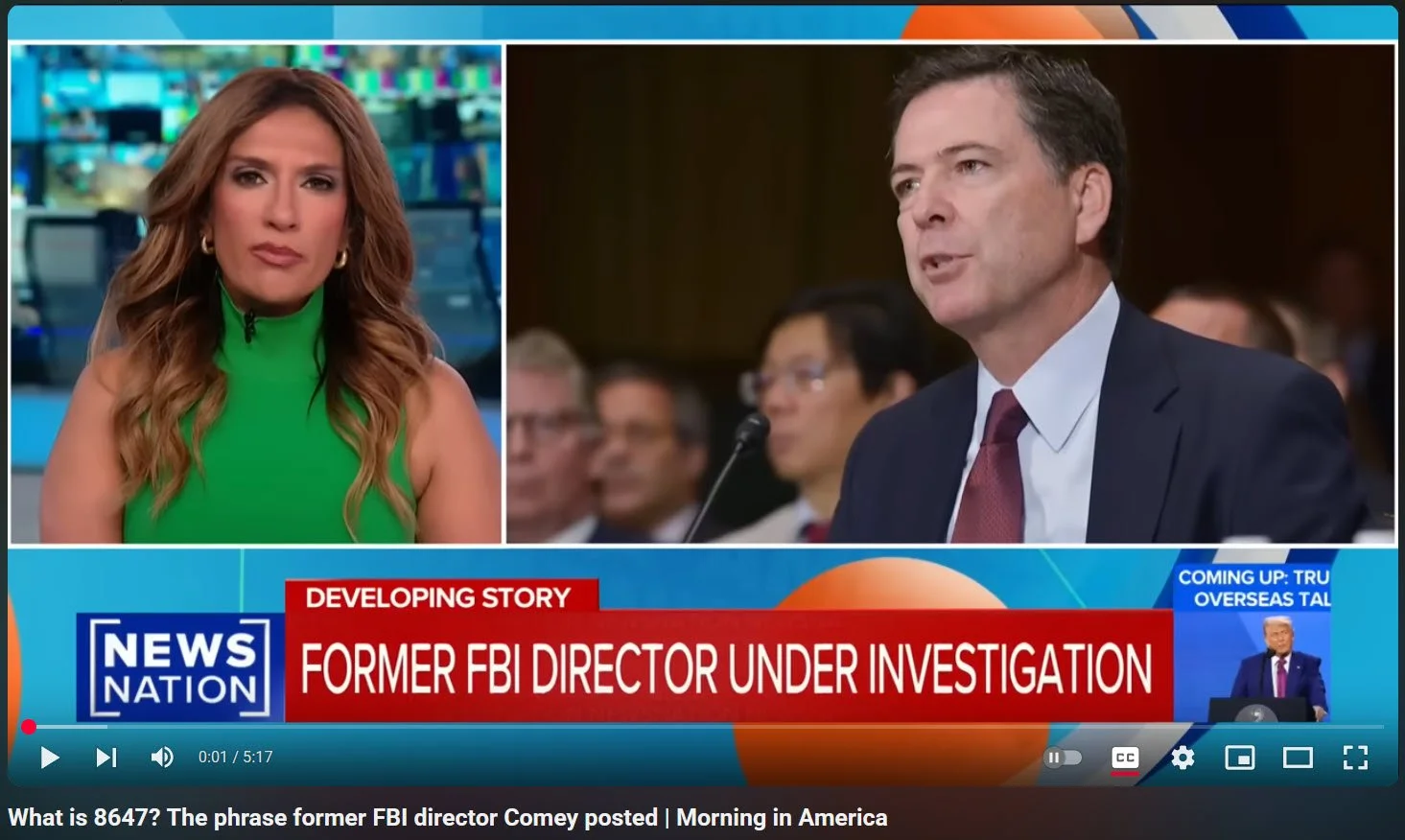And this Guy Was Head of the FBI
Segment #581
Not a good look
In his memoir A Higher Loyalty Comey opined that "the stuff that gets me the most is the claim that I am in love with my own righteousness." Comey’s well documented poor judgment is driven by his narcissism and lack of integrity. Comey personifies the concept any action is justified by the ultimate end game.
1. "No reasonable prosecutor would ever prosecute Hillary for her emails"
This is a direct quote from James Comey's public statement on July 5, 2016, when he announced the FBI's recommendation not to pursue criminal charges against Hillary Clinton.1 He stated, "Although there is evidence of potential violations of the statutes regarding the handling of classified information, our judgment is that no reasonable prosecutor would bring such a case."
Comey explained that while Clinton and her aides were "extremely careless" in their handling of classified information, the FBI's investigation found no evidence of intent to violate the law.2 He noted that prosecutions for similar offenses had historically been reserved for cases involving intentional or willful misconduct, and since that element was missing from the Clinton case, a prosecution was not warranted.3
2. The Attorney General was "compromised"
During his testimony before the Senate Intelligence Committee in June 2017, Comey explained that a key reason he made the public announcement was his concern over the independence of the Department of Justice.4 He cited a meeting between former President Bill Clinton and Attorney General Loretta Lynch on an airport tarmac in Phoenix in June 2016.5
Comey testified that this meeting, along with other concerns, "created a compromised position for the Department of Justice in the public's mind." He stated that he felt compelled to make the final decision public to maintain the credibility of the FBI and the investigation, as he was concerned that if Lynch's office made the announcement, it would be seen as politically motivated.6 He believed the American people deserved a clear, independent conclusion from the FBI itself, rather than from a department whose leadership had just had a private, unscheduled meeting with the spouse of the person under investigation.
Yes, during his testimony before the Senate Intelligence Committee in June 2017, James Comey admitted that he had asked a friend to leak the contents of a memo to a reporter.1 He stated that he did this in the hope that it would lead to the appointment of a special counsel to investigate the Trump administration's ties to Russia.2
The friend was identified as Daniel Richman, a professor at Columbia Law School.3
Comey testified that he was concerned that President Trump might lie about their conversations, particularly after Trump tweeted about the possibility of "tapes."4 Comey's goal was to get his version of events into the public sphere.5
A subsequent report by the Department of Justice's Office of the Inspector General found that Comey had violated FBI policies by retaining and disseminating the memos, but it did not find evidence that he leaked classified information to the media.6 The DOJ declined to prosecute him.7
James Comey’s recent video talking about Taylor Swift does indeed tread into unexpectedly strange territory.
What’s Going On
On August 17, 2025, Comey posted a video on his Substack in which he openly declared he’s a “Swiftie.” Among other surprising details, he mentioned:
Being part of a family Swiftie group chat
Blasting Taylor Swift music while mowing the lawn
Attending two of her concerts and helping others afford tickets
Having memorized her songs, especially calling out “All Too Well” (the 10-minute version) and “Exile” featuring Bon Iver (Fox News)
He framed her music as a source of life advice, especially about facing bullies—implicitly contrasting that with Donald Trump—and recited lyrics from “Mean” as a kind of personal anthem:
“I bet you got pushed around… the cycle ends right now, because you can’t leave me down that road.” (Fox News)
Why It Feels “Creepy”
Critics weren’t shy about calling the video “bizarre” or “cringey.” One user described it as “the creepiest video in the history of social media” (Fox News). Commentary like that highlights the jarring contrast: a former FBI Director reciting pop lyrics while discussing national politics doesn’t fit anyone’s expectations.
Media voices amplified that sense. Megyn Kelly called the video “cringey” and even raised questions about Comey’s motives, suggesting he might be playing “humanizing” theatrics—perhaps aimed at jury appeal or public sympathy (Megyn Kelly).
What We Know from Reputable Sources
The Independent characterized it as an “oddly formal video” in which Comey described Swift’s music as a “coping mechanism” and “soundtrack” for his family’s life. He mentioned being immersed enough to have memorized all her songs—and recited lyrics from “Mean” as a message about resilience (The Independent).
Fox News echoed these claims, confirming his concert attendance history, mowing-to-music habit, and lyric recitation (Fox News).
Megyn Kelly’s show offered a critical take, calling the video bizarre and suggesting anxiety or self-preservation may animate his unusual public outreach (Megyn Kelly).
Bottom Line
Yes—there's definitely something unsettling in the combination of Comey's legal and political background with his sincere, almost stagey enthusiasm for Taylor Swift. The tone feels off because of how out-of-left-field it is for someone of his stature. But all the key details—from the memorized lyrics to the lawn-mowing group chat confession—are real, confirmed by multiple sources.
Here’s how Swifties—Taylor Swift’s fiercely loyal fanbase—reacted to James Comey’s unexpected “Swiftie” confession:
Swiftie Responses & Social Backlash
While mainstream and conservative media painted Comey’s video as bizarre or cringe-worthy, the responses from Swifties and the broader online landscape skew strongly negative:
Mockery and Disbelief
Many Swifties were quick to voice their discomfort. One user commented:“This dude was FBI Director. Let that sink in… What a weirdo… Creepy for an old man like James Comey to be a drooling fanboy of a young girl like Taylor Swift…”
Others expressed even harsher reactions, such as:
“Please tell me this is AI… Because I'm not sure I can deal with the idea that America once entrusted the FBI to this lunatic traitor.”
(The Daily Beast, Hindustan Times)Mocked as Cringey and Embarrassing
Multiple online voices labeled the clip "embarrassing," "cringey," or outright absurd, questioning Comey's motives and tone. Swift’s fans didn't hold back in their criticism.
(Indiatimes)
Contrast with Swifties' Usual Behavior
This response is especially notable given Swifties' reputation for positivity and passionate defense of Taylor Swift—typically, they're quick to turn criticism of Swift into fierce rebuttals. However, in Comey's case, the reaction was decidedly not supportive.
Their response seems rooted in:
Unease at Overly Personal Enthusiasm from a Former FBI Chief
The mismatch of context—a high-profile political figure professing fandom for a much younger pop star—felt off-tone and uncomfortable to many fans.Disdain for the Perceived Performative Aspect
Some interpreted the video as theatrical grandstanding—an attempt to humanize himself via pop culture, rather than genuine fandom.
Summary Table: What’s Going On
Group Reaction Swifties Mocked and critiqued the video as creepy and insincere Conservative Media Labeled the video eerie, manipulative, or absurd General Netizens Echoed mixed themes of cringe, alarm, and disbelief
Final Thoughts
Swifties, known for their creative fandom and emotional investment in Taylor Swift, overwhelmingly viewed Comey’s “Swiftie” moment as disconcerting rather than endearing. The jeers and skepticism stem from both the content of the message and the identity of the messenger—underscoring that not all fandom declarations are received equally.
Would you like to dive into how Swift’s wider fandom ecosystem or media outlets are interpreting this, or compare how she has handled similar declarations from other public figures in the past?







